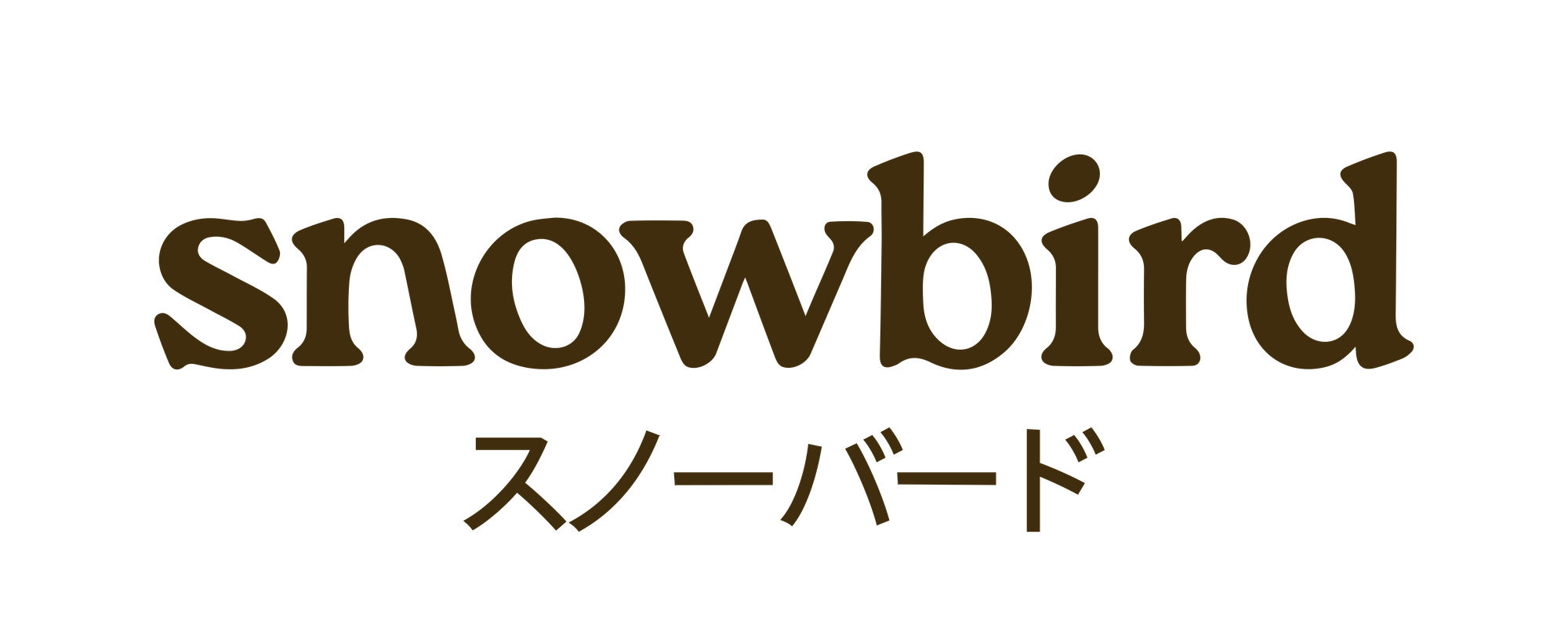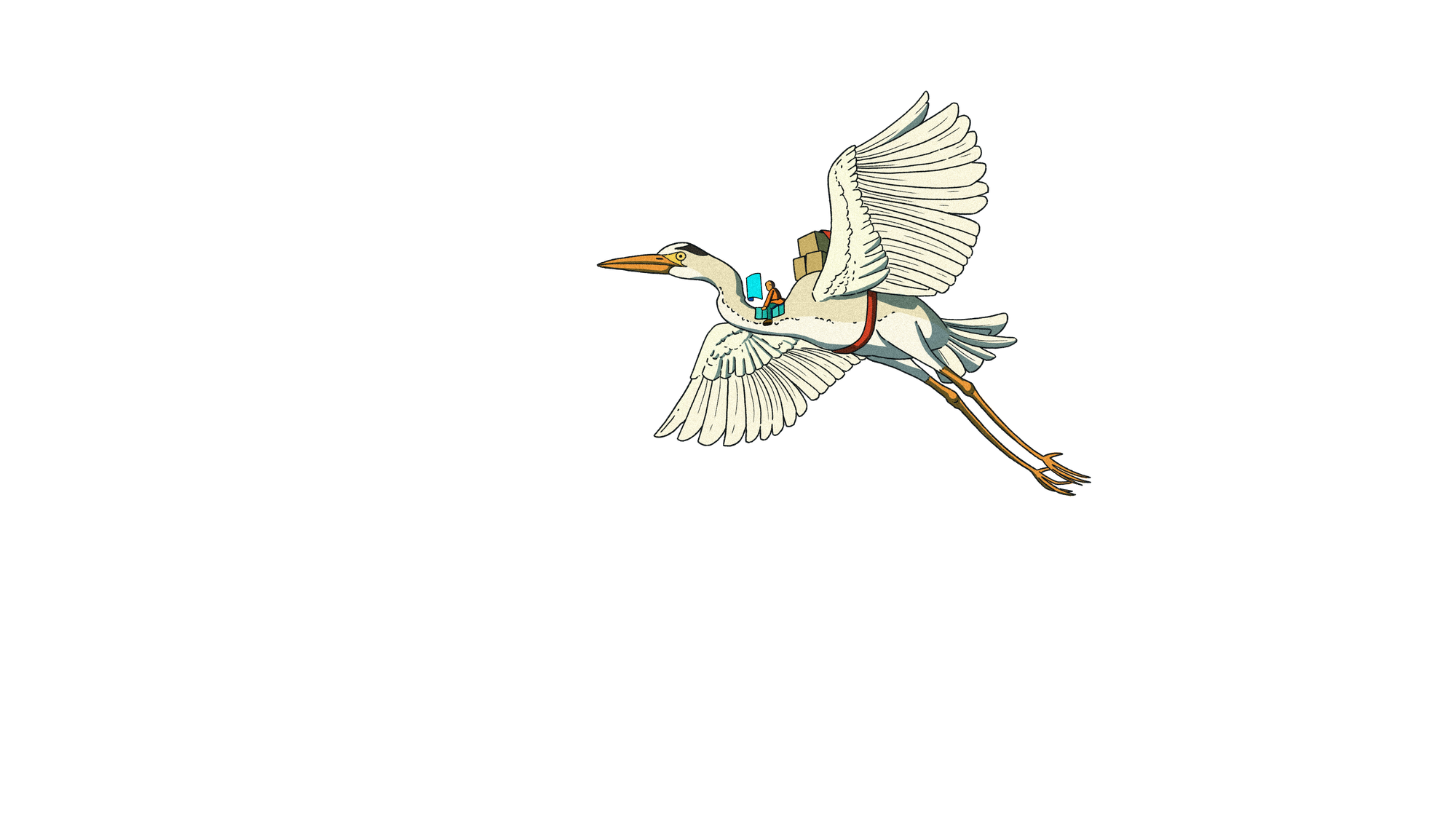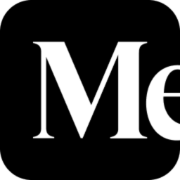Five Finds has evolved into Flyways after a two-week hiatus. Snowbird, the company, turned one this week, and it felt like a good way to celebrate. But don't fret - you'll still get five interesting finds in future editions.
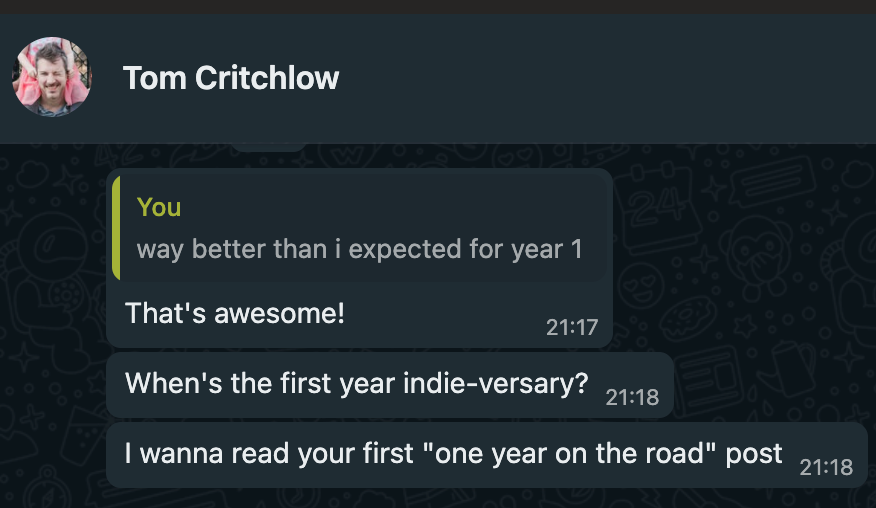
But when do you celebrate the anniversary? For my wife and I, it's easier to remember our wedding day (last week) but we like to celebrate the number of years we've been together (20!) rather than how many of those we spent married.
What about a business? Is it the day a fledgeling thought occurred to you that went "oooh that might be fun!"? Or the day you just knew what the name would be? Legally, I guess it's the day you registered the company. For me, the indie-versary is when you sign your first scope-of-work. That's this week!

I have three sets of reflections about the past year: one on the journey itself, one on the work & the company and one on the state of business.
This post is about the journey - about the last year as a lived experience. The first thing I want to acknowledge is how privileged everything I'm about to write is - to be able to work and live on your own terms should never ever ever be taken for granted. But it also shouldn't be treated like an accidental lottery ticket that will be yanked away from us. It should be observed, attended to, and given gratitude.
SURREAL AS IT GETS
I want to say "it's been surreal". But the opposite is true. The year has been tangibly lived-in. No part of it felt fast or slow - things moved at the speed of time - and I was fully present for all of it. One possible reason for this is that founding something of your own, and at least starting off alone has a way of collapsing work and non-work into just...life. The "where did that year go whooshing by" feeling hits us as life happens when we weren't paying attention. Like an ambitious 3500-piece Death Star Lego set you put together - brick by brick. You don't do it out of urgency. You don't do it out of boredom. You don't need something else to distract you from it. The individual brick shows up in front you and you show up with your attention to it.
After an impassioned analysis of the culture of work last year, I witnessed many many others who re-centered their attention - away from what compelled them to what impelled them. I was able to own my ambition - and then orient my life towards it. I got to work on some ridiculously interesting projects (more on that in the next post). But I also got to sit down for a whole 40 minutes to read the Financial Times every morning. After school drop-offs, my wife and I took short walks. I was able to take 20-min cat-naps in the afternoon. By moving away from a company's circadian rhythm and finding my own I realized evenings & nights were my peak zone. It also helped that as a fundamentally global company, most of my clients were in the US and EU.
The time I spent with my daughter remained largely unchanged, with one exception. School vacations! I was able to move my work around. Location wasn't a hassle. No return-to-office-come-to-work-or-else silliness. The vision for what snowbird can be is always evolving - that's a feature, not a bug. But what snowbird can do for us as a family has been fairly constant. A colleague asked me in Dec 2023 "what's your personal vision (as opposed to dreams for the company)". Here's what I told them: pre-school is all-year. However, once my daughter starts primary school she'll have summer vacations. And there only a few more years that she won't mind hanging out with her folks during that time. I want work that can flex enough for me to spend that time with her, go somewhere interesting as a family. Not a short vacation, but something more immersive.
The time that did change is that I spent with my wife. We spent so much time together planning for an epic world trip. Working from home, the absence of B.S calls (more on this later) and having of good proportion of US/EU clients that occupied my evenings meant the mornings and afternoons could breathe. This sounds trite, but talking is everything for our relationship. And this year allowed us more time for it than ever before - we talked about politics, about relatives, about Peru's blueberry boom, about AI ethics, about parenting, about everything-under-the-sun-that-is-not-under-NDA. We hosted friends and family more than ever before. More talking!
"Today, time lacks a solid structure. It is not a house but an erratic stream. It disintegrates into a mere sequence of point-like presences; it rushes off. There is nothing to provide time with any hold. Time that rushes off is not habitable."
- Byng-Chul Han, Philosopher
Unhurried time is what we need to talk to each other. Talking unlocks meaning. And meaning makes time less fleeting.
BUT FIRST, MARK THE EXITS
"Experimentation" gets tossed around a lot in business - on how it should be encouraged, how it should be rewarded etc. But I'll tell you why a lot of that is hokum. It's because they are uttered in conference rooms that are afraid to discuss the exit criteria. Without the honest declaration of what a failed experiment looks like, you've wasted a lot of people's time and energy.
Before quitting Google, I was reading Annie Duke's book aptly called: Quit. It has a very useful concept of Kill Criteria:
Essentially, when you enter into an endeavor, you want to imagine what you could find out that would tell you it’s no longer worth pursuing. Ask yourself, “What are the signs that, if I see them in the future, will cause me to exit the road I’m on? What could I learn about the state of the world or the state of myself that would change my commitment to this decision?”
Commitment and risk-taking make strange bedfellows. I knew that this was going to be a year of experimentation, and I needed to balance both with exit criteria.
First, if I could not make $X by the end of the year, I'd drop all this and go back to a good solid corporate job. It's all fun and games until the bills arrive. I needed some indicator of "service-market-fit" - if I could hit $X, I could work on making that $2X or $3X or whatever multiple in upcoming years. But if I couldn't even reach that initial amount, I would wrap up this regret-free experiment.
Second, after every project, I'd check-in with myself if that was fun.
FUN IS THE POINT
Roy Wood Jr - a national treasure - has a comedy special called 'Lonely Flowers' out on Hulu (it's on Disney+ outside the US I think). In it, he talks about how we've robbed ourselves of happiness - from self-checkout counters to social media - we've robbed ourselves of human connections that bring joy. The whole special is worth your time, but this quote stood out:
We just just in a weird place, man. You got to identify when you're happy. To identify who you talk to that day. That week. The foods you ate. And figure out a way to recreate that over and over. You have to be intentional about happiness the same way you do cardio and anything else you do. Like creating an environment for yourself.
I felt something similar when deciding to start my own firm. I didn't want to do it if it wasn't fun. I didn't want to be sucked into the martyr-founder-industrial-complex. So I had to find clear markers of fun. And then seek it. Or at least make sure I wasn't giving up on it when other priorities showed up. Having a $X quitting criteria alone would have made me maximize projects that were lucrative. But the fun parameter kept that in check.
Collecting other people's problems is fun for me. Following my curiosity into new and interesting worlds of Japanese real estate or Swedish energy companies is fun. Anytime there is a trail of something interesting and at the next turn, the promise of something surprising is fun. Fun also meant getting some of the orgs I work with to have some of it - a lot of them have forgotten how to have it.
THE REAL NORTH STAR IS WITHIN
An immediate effect of optimizing for ANY metric - is that it pushes us to do more of the same. But when that metric is "fun", there is an inverse correlation to (rote) repetition. The other problem is that you sometimes won't know what might trigger a growth in that metric - you only have hunches and then have to follow them.
Business gurus love to talk about a "North Star" - a seemingly unshakable goal. But even the "North Star" isn't some permanent entity - it is just a construct in Astronomy. There is always some star that is at True North, but it's not the same star through centuries. The Earth’s axis of rotation moves about in a strange way, looking very much like a slowly spinning top, turning round and round against its backdrop of stars. This movement is called precession and takes about 26,000 years to complete a full circuit. During this time, several stars will replace the role of our North Star.
So if even the cosmos can't commit to a single North Star, how can us mere mortals have a shot?
Birds do this well. How do they know they're heading North or South? They remember landmarks. They take cues from a combination of the sun and stars. But, what if it's cloudy? What if they were buffeted by wild winds? Recent experimental evidence suggests that a bird’s compass relies on subtle, fundamentally quantum effects in short-lived molecular fragments, known as radical pairs, formed photochemically in its eyes. Bonkers! The whole thing is worth a side-quest for you to follow. But, the point is they're able to orient themselves from within.
The number of projects that will START out fun is exactly ZERO. You follow your nose, keep sniffing for where the interesting bits lie within even the most (seemingly) boring clients and constantly tune that internal radar. Fun is such a personal metric. You need to make sure your internal fun-radar is never off.
This helped me say NO to clients. A bit scary to do this in year 1 - but I'm glad I did. More on this in the next post about the work itself.
IT'S GLORIOUS OUTSIDE OF BUSYLAND
Despite swarms of self-help gurus telling us how to make the most of our time, I think what we should be asking is what is the point of all of this?
From my piece on the culture of work:
The second insight I gained was that they don’t see the point of it all. There is a disconnect between what they do and what the company achieves. Chances are, you’ve seen this play out in your workday. Meetings after meetings. Meetings before meetings. Meetings about meetings. A friend of mine shared how they barely had time to have lunch that week. Every year we resolve to reduce meeting load but they gnaw their way back onto our calendars and hence our lives - embedding themselves deep into our bone structure, like some indestructible parasite. Information work thrives on collaboration and cross-pollination of ideas, but if you fail to connect individual actions to business purpose, the engagement gap will widen. The more pressure on profitability, the more they’ll demand this, the more they demand, the harder it will be for employees to disconnect - leading back to low engagement. The ouroboros of exhaustion continues.
By extracting myself from the organized body that is a corporation, two things happened:
- Fish don't know what water is. It's hard for us to question the status quo when we are in it. I was able to see things that are misshapen or broken about the way we work once I stepped out. And this enabled me to help my clients see it as well.
- I had no back-to-back meetings, no surveys to fill out that no one will ever ready anyway, no performance-review-cosplay where I had to make up reasons for why someone wasn't getting promoted because "we don't have a forced bell-curve". All this cognitive load, 0nce lifted, gave way to deep problem solving.
Anthropologist David Graeber’s came up with this theory of “bullshit jobs” - a critical review of modern work and how it often is so useless, soul-sucking, and absurd. Despite some loopholes, I find myself nodding in agreement with what David espoused:
Graeber roundly critiques the process of bureaucratization in contemporary capitalism, suggesting a type of “managerial feudalism” has developed. Corporate managers are always downsizing blue-collar or salaried workers on the grounds of poor productivity and maximizing efficiency.
However, engaged in internal company power struggles, they also, like feudal lords, hire a “retinue” of “flunkies.” This inflates their own position, as their status and often their pay are connected to how many staff are under them.
...
Why, he asks, do we as a society not object to this growth in pointless employment?
A key part of the answer is the contemporary cult of work, where people “boast” about “how overworked they are.” Graeber traces this back to moral conceptions rooted in the Puritan work ethic.
We see work as intimately bound up with our self-worth, tied to a conception of labor as a type of virtuous suffering. This explains why we haven’t advocated for reduced work—simply because it is “good in itself”!
I can tell you I'd be TERRIBLE at what I do if I was 'too busy'. The craft of strategy is deeply creative work. It can't happen if you're entrapped by busyness. Well, at least the output will be crap if you still are. I love this piece by Roger Martin about this:
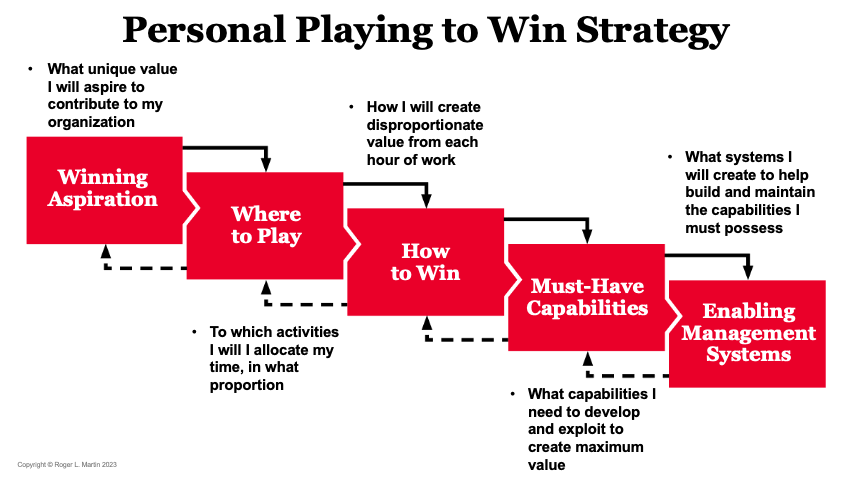
Big corp bureaucracies feast on endless stream of false urgencies. It felt great not to feed them.
TAKE THE CALLS. TALK TO PEOPLE. LET THE CASCADES FLOW.
The busyness trap makes you assign value to your own time differently. I've told the same to multiple teams I've managed to "be fiercely protective of your time". But I never qualified it - protect against what? Or whom? We tend to prioritize time that has some form of return-on-investment - and that return is usually defined by the corporation you're part of. It shuts you off to any serendipity.
When I was in London leading parts of the Google Cloud business, we had an incredibly promising mid-level-manager on the extended team the leadership identified as "high-potential". To find them a mentor who would be a bit removed from the day-to-day of Cloud, I reached out to a Senior Director of Brand on the wider London-based team asking "Hey, we think this person is so talented and you've got such rich experience, would you mind being their mentor." The response was immediate "sorry I have no cycles for this" - that is big-tech-corp-speak for "this is not worth my time." It is wholly ironic that this very leader has now set up their own mentorship-adjacent business after Google where they are "helping brilliant women grow their influence." The quest for precision-productivity makes us treat distractions and serendipity the same way - with little room for either.
Given this was going to be a year-of-yes, I took every intro call I encountered. I shot my shots with old colleagues and distant acquaintances. Events always happen in cascades of probabilities - the question is are you planting enough seeds for these cascades to grow and flow. A seemingly random musing on LinkedIn led to a DM from a stranger in UK vibed with what I had written. That DM turned into a Zoom call which turned into an introduction to his friends in Japan. That intro and subsequent Zoom calls later, I'm sitting in Tokyo with these very people a few weeks later. I'm now a "fellow" of the company helping out on a wide range of clients. This probabilistic cascade could have been cut-short at any time if I had chosen to think it wasn't worth my time.
There were others where the flow of good probabilistic juju was just not present - I did cut those short. Back to that intrinsic north star - in a world riddled with quantized nonsense, tuning our instincts is probably the best thing we can do.
This has been the most interesting but least frenetic year of my life. And I plan to sow more seeds of these cascades in the upcoming one.

